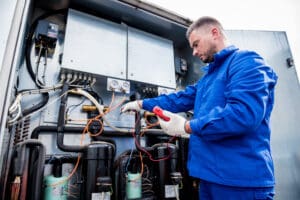Environmental Factors Impacting HVAC Maintenance
Maintaining efficient and reliable HVAC systems is a critical component of facilities management that directly impacts your company’s employees and customers. HVAC systems are the heart of any building’s comfort, ensuring proper heating, ventilation, and air conditioning. However, various environmental elements can significantly influence the type and frequency of maintenance required for these systems. In this article, we’ve compiled information about environmental factors impacting HVAC maintenance specific to Southern Oregon, offering insights for facilities managers to optimize their maintenance strategies.
 Common Environmental Factors Impacting HVAC Maintenance for Southern Oregon Businesses
Common Environmental Factors Impacting HVAC Maintenance for Southern Oregon Businesses
1. Temperature Variations
Southern Oregon experiences a diverse climate with significant temperature fluctuations throughout the year. Summers are typically hot, with temperatures often exceeding 90°F, while winters can be cold, with temperatures occasionally dropping below freezing. These temperature extremes place varying demands on HVAC systems.
During the hot summer months, HVAC systems work harder to maintain cool indoor temperatures. This increased workload can lead to faster wear and tear on components such as compressors and condensers. Facilities managers should schedule more frequent inspections and maintenance during this period to ensure optimal performance and prevent breakdowns.
In the winter, HVAC systems shift focus to heating. Cold temperatures can cause issues such as frozen pipes and increased strain on heating elements. Regular maintenance before and during the winter season is essential to ensure heating systems function efficiently and prevent unexpected failures.
It’s best to schedule an HVAC checkup and maintenance before each season begins rather than dealing with a downed system and repairs when temperatures are extreme.
2. Air Quality
Air quality is a critical factor in HVAC maintenance. Various factors, including wildfires, pollen, and industrial activities, can impact Southern Oregon’s air quality.
Wildfire Smoke: Southern Oregon is prone to wildfires, especially during the dry summer months. Smoke from these fires can significantly degrade air quality, introducing particulates and pollutants into HVAC systems. Filters can become clogged quickly, reducing airflow and increasing the risk of system damage. Facilities managers should proactively replace filters more frequently during wildfire season and consider using higher-efficiency particulate air (HEPA) filters to capture smaller particles.
Pollen: The region’s diverse vegetation can produce high pollen counts, particularly in the spring. Pollen can accumulate in HVAC systems, reducing efficiency and causing allergic reactions among building occupants. Regular cleaning and replacing air filters during high pollen seasons can mitigate these issues.
Industrial Pollution: If your business is located in an industrial area, your HVAC system could be pulling in air containing pollutants and chemicals, which can be corrosive to HVAC components. Facilities managers should monitor air quality and ensure that HVAC systems have appropriate filtration and maintenance schedules to address these contaminants.
3. Humidity Levels
While Oregon doesn’t experience the same high humidity level as other parts of the country, it is still significant. Humidity levels in Southern Oregon vary seasonally and can affect HVAC performance and maintenance needs.
In the summer, higher humidity levels can increase the cooling load on HVAC systems, making them work harder to dehumidify indoor air. This additional strain can lead to issues such as condensation buildup and mold growth within the system. Regular maintenance should include checking and cleaning condensate drains and ensuring that dehumidification components function properly.
In the winter, heating can dry indoor air excessively, leading to static electricity and discomfort for occupants. Facilities managers should consider using humidifiers as part of the HVAC system and scheduling regular maintenance to ensure they operate effectively.
4. Seasonal Changes and Maintenance Timing
Seasonal transitions are a critical time for HVAC maintenance. In Southern Oregon, the shift from winter to spring and from summer to fall can introduce unique challenges.
Spring Maintenance: As temperatures rise and pollen levels increase, spring is an ideal time for a comprehensive HVAC system checkup. This includes inspecting cooling components, cleaning coils, and replacing filters. Addressing these tasks before the peak cooling season ensures that the system operates efficiently during the hot summer months.
Fall Maintenance: Fall is the time to prepare for the colder months ahead. Facilities managers should focus on inspecting and servicing heating components, checking for any issues with heat exchangers, and ensuring that thermostats and controls are calibrated correctly. Preventive maintenance in the fall can help avoid emergency repairs during the winter.
5. Energy Efficiency, Technology Advancements, and Other Factors
Energy efficiency is a key consideration in HVAC maintenance. In Southern Oregon, most newer structures are constructed with energy efficiency and environmental impact in mind. These considerations often lessen the strain on HVAC systems and make them easier to maintain.
For example, proper insulation and sealing significantly affect HVAC operations. Good insulation and sealing of buildings are essential to maintain energy efficiency. Inadequate insulation can lead to heat loss in winter and heat gain in summer, causing HVAC systems to work harder. The better your building is insulated, the less strain heat loss will have on your system, and it should help your system last longer. Facilities managers should regularly inspect insulation and sealing, addressing gaps or leaks to improve system efficiency.
Advancements in HVAC technology offer new opportunities for optimizing maintenance schedules and improving system performance.
Smart HVAC systems equipped with sensors and IoT capabilities can provide real-time data on system performance and environmental conditions. Facilities managers can leverage this data to anticipate maintenance needs, detect issues early, and optimize energy consumption.
Predictive maintenance uses data analytics to predict when HVAC components will likely fail, allowing for proactive repairs. Implementing predictive maintenance strategies can help facilities managers reduce downtime, extend the lifespan of HVAC systems, and minimize maintenance costs.
Choose Stone Heating and Air to keep your company’s HVAC system operating well.
Many environmental factors impact HVAC maintenance. By understanding the impacts of temperature variations, air quality, humidity levels, and seasonal changes, facilities managers can develop proactive maintenance strategies that ensure the efficiency and reliability of their HVAC systems. Contact the professionals at Stone Heating and Air today to establish an effective HVAC maintenance program appropriate for your system and the environmental factors your building is exposed to. We’ll keep your employees and customers comfortable throughout the year.
Category: Commercial HVAC, HVAC, HVAC Services and Repair
Request An Appointment
Related Content



 Common Environmental Factors Impacting HVAC Maintenance for Southern Oregon Businesses
Common Environmental Factors Impacting HVAC Maintenance for Southern Oregon Businesses
